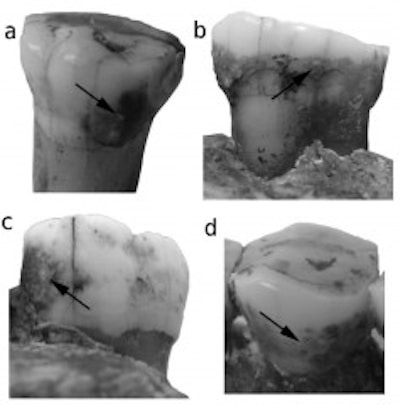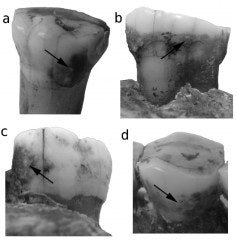
Researchers from George Washington University and the Smithsonian Institution have discovered evidence to debunk the theory that Neanderthal's disappearance was caused in part by a deficient diet -- one that lacked variety and was overly reliant on meat (Proceedings of the National Academy of Sciences, December 27, 2010).
After discovering starch granules from plant food trapped in the dental calculus on 40,000-year-old Neanderthal teeth, the scientists concluded that Neanderthals ate a wide variety of plants and included cooked grains as part of a more sophisticated, diverse diet similar to early modern humans.
 |
| Starch granules from plant food were discovered trapped in the dental calculus on 40,000-year-old Neanderthal teeth, leading scientists to believe that Neanderthals ate a more sophisticated, diverse diet similar to early modern humans. |
The discovery of starch granules in the calculus on Neanderthal teeth provides direct evidence that they made sophisticated, thoughtful food choices and ate more nutrient-rich plants such as date palms, legumes, and grains such as barley.
Until now, anthropologists have hypothesized that Neanderthals were outlived by early modern humans due in part to the former's primitive, deficient diet, with some scientists arguing that Neanderthals' diets were specialized for eating meat. As such, during major climate swings Neanderthals could be outcompeted by early humans who incorporated diverse plant foods available in the local environment into their diets.
The discovery by Dr. Henry and her colleagues suggests otherwise. The starch granules were found in dental calculus on the fossilized teeth of Neanderthal skeletons excavated from Shanidar Cave in Iraq and Spy Cave in Belgium. Starch granules are abundant in most human plant foods but were not known to survive on fossil teeth this old until this study.
The researchers' findings indicate that Neanderthals' diets were more similar to those of early humans than originally thought. The researchers also determined from alterations they observed in the starch granules that Neanderthals prepared and cooked starch-rich foods to make them taste better and easier to digest.
"Neanderthals and early humans did not visit the dentist," said Alison Brooks, PhD, professor of anthropology and international affairs at George Washington University. "Therefore, the calculus or tartar remained on their teeth, preserving tiny clues to the previously unknown plant portion of their diets."
Copyright © 2010 DrBicuspid.com















